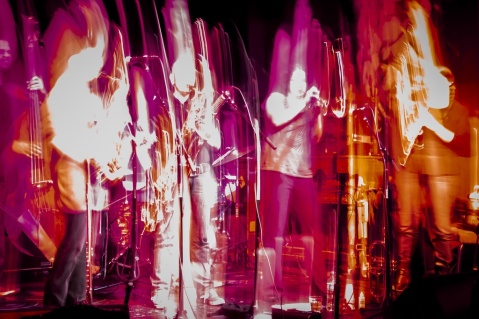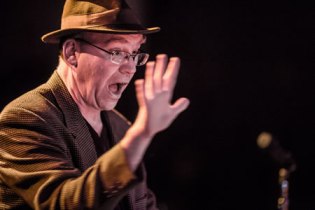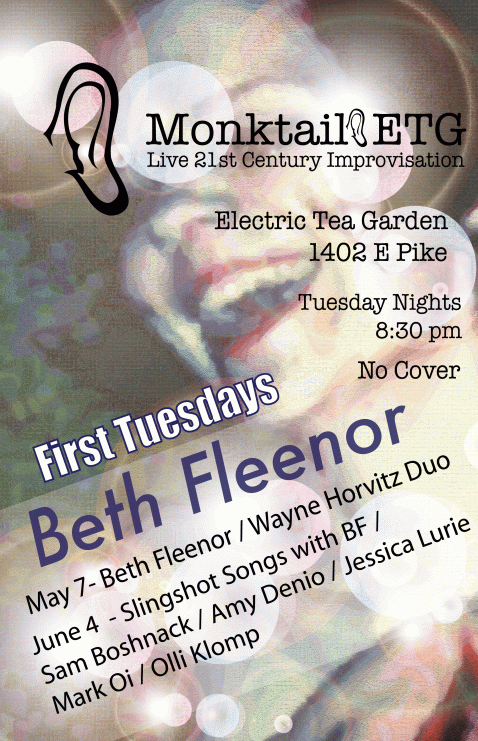SLINGSHOT SONGS (EAST & WEST) WITH JESSICA LURIE, SAM BOSHNACK & BETH FLEENOR
Monday, May 27
10pm (NYC)
Spectrum
121 Ludlow
Floor 2
(ring bell for 2)
Tuesday, June 11
8pm (SEATTLE)
Royal Room
5000 Rainier Ave S
SLINGSHOT SONGS is a new collaborative improvising ensemble of mostly Seattle -based or originated musicians, coming together on the east and west coasts to create new soundscapes and storytelling. Led by Jessica Lurie on saxophone, Beth Fleenor on clarinet, and Sam Boshnack on trumpet, they gather together a group of dynamic friends, improvisers, composers and leaders of their own projects as internationally to perform on both coasts. Together they embrace high energy interaction and a genre-busting sound.
NYC show will also feature Izzak Mills (saxophone, flute), Rene Hart (bass), and Peter Kronrief (drums).
SEA show will also feature Mark Oi (guitar), Evan Flory-Barnes (bass), and Olli Klomp (drums).
NY TIMES: WAYNE HORVITZ AND ROYAL ROOM COLLECTIVE AT THE STONE “IMPROV TO TUNE OF A TEACHER”
“Mr. Horvitz kept his attention on the band with microscopic focus, quick-cutting between contrasts, putting something free or rippling against a fixity. It held your attention, and when it was perverse, it was just perverse enough.”
photo by Michelle V. Agins/The New York Times
TIMEOUT NY: WAYNE HORVITZ RESIDENCY
A pillar of the NYC downtown-music community who decamped to Seattle ages ago, Wayne Horvitz sets up shop at the Stone to show his old homies what he’s been up to….. > read more
photo by Daniel Sheehan
WAYNE HORVITZ & ROYAL ROOM COLLECTIVE MUSIC ENSEMBLE HIJACK THE STONE (NYC) MAY 21-26
The Stone (NYC)
Avenue C & 2nd
$15
Information: www.waynehorvitz.net / www.theroyalroomseattle.com
May 21-26 Wayne Horvitz and the Royal Room Collective Music Ensemble (RRCME) hijack the Stone. Presenting six nights of new music, the RRCME performs Horvitz’s compositions, combining “Conduction” and spontaneous arrangement & orchestration, created by Horvitz in real time. In addition to the eight sets of music presented by the RRCME, the week-long residency will also feature Horvitz’s quartet Sweeter Than the Day with special guests, and a night of duets with Horvitz and a selection of collaborators including Bobby Previte (drums), Sara Schoenbeck (bassoon), Briggan Krauss (alto sax), and Beth Fleenor (clarinet/voice), among others.
In conjunction with their residency, the ensemble is releasing a limited edition live recording, created at the Royal Room*.
Specifics:
5/21 Tuesday
8 & 10 pm Wayne Horvitz & the Royal Room Collective Music Ensemble with Special Guests
5/22 Wednesday
8 pm The Westerlies Play Horvitz
Zubin Hensler, Riley Mulherkar (trumpets) Andy Clausen, Willem de Koch (trombones)
10 pm Wayne Horvitz & the Royal Room Collective Music Ensemble with Special Guests
5/23 Thursday
8 pm Wayne Horvitz & the Royal Room Collective Music Ensemble with Special Guests
10 pm Wayne Horvitz and Sweeter Than the Day
Wayne Horvitz (piano) Geoff Harper (bass) Eric Eagle (drums) + Members of the RRCME (various)
5/24 Friday
8 pm Wayne Horvitz & the Royal Room Collective Music Ensemble with Special Guests
10 pm The Westerlies Play Horvitz
Zubin Hensler, Riley Mulherkar (trumpets) Andy Clausen, Willem de Koch (trombones)
5/25 Saturday
8 pm Wayne Horvitz Duets
(including Bobby Previte, Sara Schoenbeck, Briggan Krauss, Beth Fleenor & others)
10 pm Wayne Horvitz & the Royal Room Collective Music Ensemble with Special Guests
5/26 Sunday
8 and 10 pm Wayne Horvitz & the Royal Room Collective Music Ensemble with Special Guests
NEW PARIS HURLEY WORK PREMIERING IN JUNE
The NW New Works festival is two weekends of performance that has been helping shape the future of art in the Pacific Northwest for 30 strong years. Paris Hurley will premiere new work in the On the Boards studio theater June 14 at 8pm & June 15 – 16 at 5pm.
Festival dates: Fri – Sun, Jun 7 – 9 & 14 – 16, 2013
More information: http://www.ontheboards.org/nw-new-works-festival
WEEKEND 1
Studio Theater
June 7 at 8pm & June 8 – 9 at 5pm
PE|Mo – dance
Pony World Theatre
Claire Thomforde-Garner (Portland) – dance
AJA – theater/dance
Mainstage Theater
June 8 – 9 at 8pm
Maxie Jamal | The Mystiquesterium – theater/dance
Elia Mrak – dance
Allie Hankins – dance
Josh Martin (Vancouver BC) – dance
Install Performance
(June 9 & 16)
WOOD – dance
WEEKEND 2
Studio Theater
June 14 at 8pm & June 15 – 16 at 5pm
Jeffrey Fracé – theater
The Eternal Glow Project – theater/dance
AMADOR/STOKES – theater
Paris Hurley – dance/music
Mainstage Theater
June 15 – 16 at 8pm
The Satori Group – theater
Paul Budraitis – theater
bobbevy (Portland) – dance
The New Animals – dance
“MY ONLY MENTOR, BUTCH MORRIS (1947-2013)” BY WAYNE HORVITZ
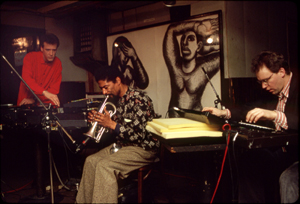 “I met Butch Morris shortly after moving to New York City in 1979. I am not sure how or when, but he was extremely gracious to me, became a lifelong friend, and I can honestly say he is the only single human being who I think of as a mentor. It wasn’t about music in any technical sense, but really more in a social sense: How music fit into his life, how he created community, what he cared about, what he didn’t care about, and so on. The fact that Butch was fun, charming, a great person to travel with, to dine and drink with, and to hang with is something everyone who knew Butch can speak to. I could go on for many pages, even chapters, but I will not. Instead I would like to speak to two singular aspects of Butch’s contribution to music since he came on the scene in the ‘70s: community and conduction.
“I met Butch Morris shortly after moving to New York City in 1979. I am not sure how or when, but he was extremely gracious to me, became a lifelong friend, and I can honestly say he is the only single human being who I think of as a mentor. It wasn’t about music in any technical sense, but really more in a social sense: How music fit into his life, how he created community, what he cared about, what he didn’t care about, and so on. The fact that Butch was fun, charming, a great person to travel with, to dine and drink with, and to hang with is something everyone who knew Butch can speak to. I could go on for many pages, even chapters, but I will not. Instead I would like to speak to two singular aspects of Butch’s contribution to music since he came on the scene in the ‘70s: community and conduction.
When I arrived in New York, the city and the Lower East Side, in particular, was a diverse community. Punk rock and out jazz, improvised music and new classical music crossed paths constantly, as did people of divergent backgrounds. It was a racially integrated community as well, but only so far. Sort of like the high school where kids basically get along, but still the white kids tend to sit together in the lunchroom and so do the black kids. Butch was keenly aware of what being a black man in America meant. He had no delusions of living in a “post-racial” world, and he was vocal and articulate about racism. I myself had come to New York because of Cecil Taylor, The Art Ensemble, et al., but it wasn’t surprising that I quickly fell in with my more immediate peers: Elliott Sharp, Bobby Previte, John Zorn, Eugene Chadbourne, and many, many more. We were white kids from the ‘60s. It’s important to remember that, like a lot of us, I came to improvised music more from The Grateful Dead and The Jefferson Airplane only to find Albert Ayler and Sun Ra later. Butch reached out to me, and to many others, without ever leaving behind his history and inspirations. He didn’t care if the jazz community approved of him, and he sure as hell didn’t care if the academy or the uptown music world approved of him, and he took chances, musically and socially. And he did it with such grace that as far as I can tell he rarely alienated anyone, which was not often the case in a scene where a lot of egos were involved and folks had powerful opinions with strong emotional attachments. In many ways this seems to me to be a crucial aspect of what led him to what he became best known for, which was the system known as conduction.
As a musician I got to play a lot with Butch, in small groups as well as some of his larger ensembles. I made three of my first five records with Butch, toured in his trio with J. A. Deane a lot, as well as the Horvitz/Morris/Previte Trio. Later I produced a record for Butch and was involved in the early conduction ensembles. The Horvitz/Morris/Previte Trio was a seminal moment in my own artistic evolution. To put it in its absolute simplest form, after a few years of wanting to be Cecil Taylor I remembered how much I loved Richard Manual, and something began to click that felt like my own. Many other influences helped along the way, especially the Chicago and St. Louis musicians, and the Art Ensemble of Chicago in particular. I made a record for Black Saint from a live recording at Studio Henry with Butch and William Parker, and I began to find ways to bring my own harmonic language into the palette of “free improvisation” (whatever that means), and also to use electronics with acoustic instruments and at acoustic volumes. Butch was particularly supportive and encouraging, often without really saying much. The trio I formed with Butch and Bobby allowed me to develop those ideas. We made two records that I still consider some of my best work, and Butch played beautifully. It is worth noting that they were also two of the easiest recordings I have ever made. Just set up, play, listen a bit, and keep playing. We toured Europe a few times and did concerts around the States a bit, and we had a lot of fun.
I remember years ago going to his apartment to listen to the mixes of a record we were working on. He had the left speaker on top of the right speaker, and I was furious. How could we listen to a stereo mix that way? He wouldn’t move the speakers, that was how he liked it. He didn’t give a damn. I wouldn’t be honest if I didn’t say I miss those times, often deeply.
For a variety of reasons, including my move to Seattle, I did not perform in Butch’s conduction ensembles much after the early ‘90s. For the most part I stopped being involved in what really became his life’s work. Nonetheless, as a composer, I have given “conduction” a lot of thought, and I find it a singular and momentous achievement. It has been interesting, and honestly a bit disheartening, to see just how much attention Butch and conduction have been given by the media and social media since his death, considering how much it was essentially ignored in his lifetime. There are many stories of its success and positive reception but nothing close to what, in my opinion, many artists have received for much lesser contributions to the very essence of how music evolves. I believe that this is for the most part a result of how Butch liked to live, and what his priorities were.
I was on a music panel in the late ‘90s selecting the first round of musicians and composers who would be in residence at Civitella Ranieri. Unlike a lot of panels, we arrived a day or two early and were given copies of all the work samples from the artists. On the second evening, after food and wine, I went back to my cell and braced myself for hours more of listening through work samples. The residency very much encouraged improvised music, jazz, and international artists, as well as more traditional contemporary composers. I listened to the work of a lot of experimental composers and jazz composers, many of whom I was already familiar with, as well as a lot of new music composers, some of whom I did not know. I knew Butch had applied, and I assumed I would support his application, but it occurred to me that if I was going to articulate my position I should listen to the work sample he submitted. In fact I had yet to hear any of the ten-CD box set he had made for New World Records, but whatever I was then listening to seemed to answer all the questions and even feelings of discontent I had been having all evening. First off, the music didn’t sound anything like jazz or “improvised music,” it sounded like vital contemporary music, possibly composed but also unlike so much of the “new music” I had been listening to. How should I say this? Like it didn’t have a stick up its ass? It sounded comfortable in its own skin—soaring, living, glorious. Granted it was three in the morning, I was tired, maybe even a little drunk, but I still remember it to this day. George Lewis and Jonathan Harvey were also on the panel, and as I walked in the next morning I heard Jonathan Harvey talking to Gordon Knox, the artistic director, saying, “It was quite interesting listening to many of the work samples, but there is only one CD I would like permission to keep, and that is the music of this Butch Morris fellow. I must find out how he creates this incredible music.”
I was in Nashville shortly thereafter, producing a fairly traditional record with some Nashville session guys, and I started thinking about comfort zones. I don’t mean an aesthetic comfort zone, I mean physical comfort. Music sounds good when the physical relationship between performer and instrument is good. Technique and expression come from this. Which is why I think that when you take a classical violinist with great chops, conversant in modern music and with experience playing in great ensembles, and he or she spends two weeks with Butch, their improvised language often sounds brilliant, with flow and grace.
A problem in contemporary music, especially of the through-composed variety, is that often the composer creates situations that aren’t comfortable for the performer. I suppose that in itself has its place, but it can get old fast. A composer creates a new work with extended techniques and writing that “pushes the envelope” and all too often it sounds like work, not play, and after all we try to play music, not work it. Musicians improvising, even if they aren’t “improvisers,” will usually make choices that are within their physical comfort zone and within their technique. This creates music that has the same level of physical logic that these same performers possess when they are playing Mozart or Hank Williams. Meanwhile Butch found a language that created structural integrity, something sorely missing in so much so-called “improvised music.” Cecil Taylor and many others have spoken eloquently about the logic inherent in the body, that the logic of our physical relationship to our instruments has an innate intelligence. Butch never wanted to lose sight of that, but he also insisted on never assuming anything about structure, and he developed a methodology that allowed the music to turn on a dime. Of course one can argue that his music was also, like Ellington’s, personality dependent. With Butch, his conductions were, of course, an expression of his entire being. There will never be another conduction by Butch, with all that he brought to the music. That being said, and I think Butch would be pleased, I truly believe that his system is significant enough that it will live on in many forms, will transform and evolve, and have great influence on the music of our times.
No matter how far out the music got, Butch always wanted it to feel like a song, like a singular piece of music, and his system and his presence allowed him to create that. It didn’t always work. No music always works. But the potential was phenomenal, and it created a music that simply couldn’t exist any other way.
Butch’s humanity was phenomenal. Every one of us who feels like Butch was one of our dearest friends knows we share him with hundreds of other people, if not more.
People work so hard to be present, to live in the moment. I know Butch loved to be alone, and I know he loved to be with people. To me he seemed to live less in the past or future then anyone I have ever known. On the street, in the park, in an airport, even waiting for a cab, he was always there for you, and now he isn’t.”
[Essay published February 21,2013: NewMusicBox.org; Photo: Butch Morris (center) performing with Christian Marclay (left) and Wayne Horvitz (right) at the Times Square-area bar Tin Pan Alley in 1987. Photo by Keri Pickett, courtesy Wayne Horvitz]
SPONTANEOUS CONDUCTION: BUTCH MORRIS TRIBUTE WITH JA DEANE & WAYNE HORVITZ 5/11
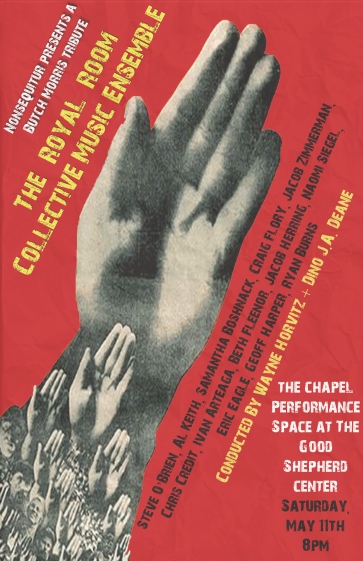 Saturday,
Saturday,
May 11
8 pm
$5 – $15 sliding scale
suggested donation at the door
(cash/checks only)
presented by Nonsequitur
This tribute to the brilliant Butch Morris, who passed away earlier this year, features two of his closest friends and musical colleagues – Wayne Horvitz (Seattle) and JA Deane (New Mexico) – using the conduction techniques developed and pioneered by Morris with the Royal Room Collective Music Ensemble. Employing an elaborate repertoire of hand signals, Horvitz and Deane guide the musicians through spontaneous compositions in which the musicians control the content while the conductors control the form and structure.
Lawrence D. “Butch” Morris (1947-2013) was a composer and trumpet/cornet player known for developing the concept of “conduction,” a method of using elaborate hand signals to guide diverse ensembles of improvising performers through large-form works that draw on the spontaneous elements of group improvisation while retaining the formal logic and structure of composition. Morris was hugely influential, working with musicians from many countries, cultures, and musical styles. Some of the artists who worked with him went on to form their own conduction ensembles based on his techniques.
Wayne Horvitz is a composer, pianist, and electronic musician, and a co-founder of the Royal Room in Columbia City. He has performed extensively throughout Europe, Asia, Australia, and North America with a wide range of collaborators: Bill Frisell, Butch Morris, John Zorn, Robin Holcomb, Fred Frith, Julian Priester, Philip Wilson, Michael Shrieve, Bobby Previte, Marty Ehrlich, Skerik, William Parker, Ron Miles, Sara Schoenbeck, Peggy Lee, Steven Bernstein, Briggan Krauss, and Dylan van der Schyff, among many others. Some recent projects include JOE HILL: 16 Actions for Chamber Orchestra, Voices and Improviser, and These Hills of Glory for string quartet and improviser. Ensembles include The President, Pigpen, Zony Mash, The HMP Trio, The New York Composers Orchestra, The 4 Plus 1 Ensemble, Sweeter Than the Day and The Gravitas Quartet.
JA Deane (“Dino”) is a multi-instrumentalist, sound-designer, and conductor now living in rural New Mexico. As a trombonist he has played with everyone from Ike & Tina Turner to Jon Hassell and Brian Eno. He became a close collaborator in Butch Morris’ real-time composition creations called Conductions and in 1995 co-produced Morris’s epic 10 CD box set Testament for New World Records. Deane has an extensive background in composition for modern dance having created over fifty dance/music works with dancer/choreographer Colleen Mulvihill. He has an equally long history creating sound design for dramatic theater, working with Sam Shepard, Julie Hebert, and Theater Grottesco. Inspired by his experience with Butch Morris, Dino formed the conduction ensemble Out of Context, which he has led in New Mexico since 1997.
The Royal Room Collective Music Ensemble is a 15-20 piece band featuring some of Seattle’s finest and most innovative improvisers under the direction of composer Wayne Horvitz. Tonight’s members include Ivan Arteaga, Sam Boshnack, Ryan Burns, Chris Credit, Eric Eagle, Beth Fleenor, Craig Flory, Geoff Harper, Jacob Herring, Al Keith, Steve O’Brien, Christian Pincock, Naomi Siegel, and Jacob Zimmerman.
